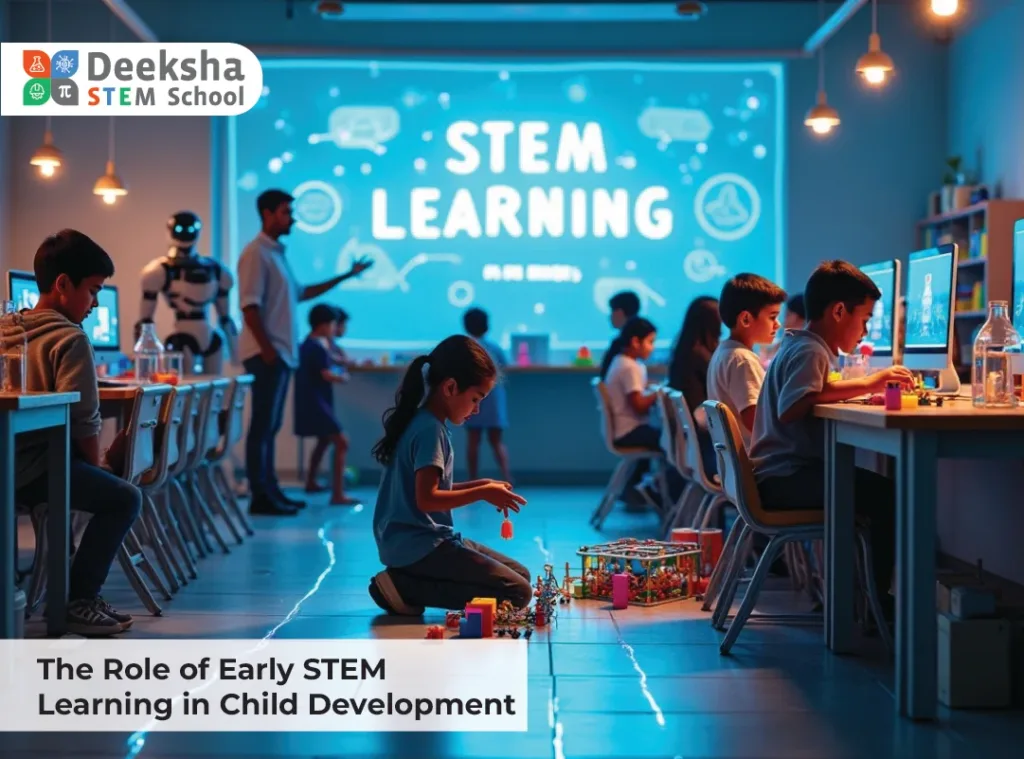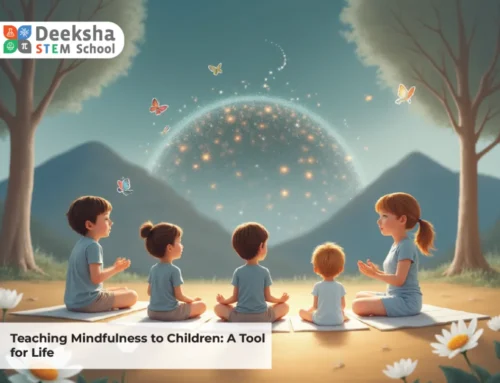Early childhood is a crucial period of rapid growth and development, where foundational skills that shape future learning and success are formed. Introducing children to Science, Technology, Engineering, and Mathematics (STEM) during these formative years lays the groundwork for intellectual curiosity, problem-solving abilities, and lifelong learning. Early STEM education not only fosters academic skills but also supports cognitive, social, and emotional development.
At Deeksha STEM Schools, we understand the significance of integrating STEM education from an early age. Our programs are designed to nurture young minds, encouraging creativity, curiosity, and a passion for innovation through engaging and age-appropriate learning experiences.
Why Early STEM Learning Matters
Introducing children to STEM concepts early in life can have a transformative effect on their development. Research shows that early exposure to STEM encourages:
- Cognitive Development: Engaging with STEM activities enhances critical thinking, memory retention, and problem-solving skills.
- Language Development: Discussing scientific concepts and explaining problem-solving processes strengthens vocabulary and communication skills.
- Social and Emotional Growth: Collaborative projects foster teamwork, empathy, and resilience.
- Curiosity and Creativity: Encourages children to ask questions, explore new ideas, and develop innovative solutions.
- Preparation for Future Learning: Builds a strong foundation for more advanced learning in later academic years.
Key Benefits of Early STEM Education
1. Enhances Cognitive Skills
Early STEM learning stimulates brain development by encouraging children to think logically, analyze situations, and develop solutions:
- Hands-On Activities: Experiments and building projects help improve memory and comprehension.
- Pattern Recognition: Activities like sorting and matching develop early math skills.
- Problem-Solving Exercises: Simple puzzles and challenges promote logical thinking and reasoning.
2. Fosters Creativity and Innovation
STEM education goes beyond technical skills—it inspires creativity and encourages children to think outside the box:
- Engineering Projects: Building structures with blocks, Legos, or craft materials cultivates spatial reasoning and innovation.
- Technology Integration: Exposure to coding games and digital storytelling enhances creative expression.
- Science Experiments: Simple experiments help children explore cause-and-effect relationships while encouraging curiosity.
3. Builds Social and Emotional Skills
Collaborative STEM activities promote teamwork, empathy, and communication:
- Group Projects: Encourage cooperation and teamwork through shared problem-solving.
- Communication Exercises: Activities that require explanation of ideas build confidence in expressing thoughts.
- Emotional Resilience: Learning through trial and error teaches perseverance and patience.
4. Promotes Early Math and Science Literacy
Early exposure to math and science concepts lays a strong foundation for academic success:
- Basic Numeracy Skills: Counting, measuring, and pattern recognition develop early mathematical understanding.
- Scientific Inquiry: Encourages children to observe, ask questions, and make predictions.
- Technology Awareness: Introduces children to basic coding concepts, fostering digital literacy from a young age.
Strategies for Parents to Encourage Early STEM Learning at Home
Parents play a pivotal role in nurturing an interest in STEM. Here are practical ways to introduce STEM concepts into everyday life:
1. Encourage Exploration and Curiosity
- Provide age-appropriate science kits and educational toys.
- Engage in outdoor activities like nature walks, gardening, and stargazing.
- Encourage open-ended questions and allow children to seek their own answers.
2. Incorporate STEM in Daily Activities
- Involve children in cooking to teach measurements, temperatures, and chemical reactions.
- Use household items for simple science experiments.
- Encourage building and construction play with blocks, puzzles, or DIY kits.
3. Read STEM-Focused Books and Watch Educational Programs
- Introduce books that explain scientific concepts through engaging stories.
- Watch documentaries and educational shows together.
- Use interactive STEM apps designed for young learners.
4. Provide Opportunities for Hands-On Learning
- Set up a dedicated STEM learning space at home.
- Allow children to experiment and build without strict guidelines.
- Support participation in science fairs, workshops, and robotics clubs.
How Deeksha STEM Schools Support Early Childhood Development Through STEM
At Deeksha STEM Schools, we incorporate STEM learning into our early childhood education programs with the following approach:
1. Age-Appropriate STEM Curriculum
Our curriculum is designed to introduce foundational STEM concepts through play-based learning, hands-on activities, and interactive lessons.
2. Specialized STEM Facilities
Our state-of-the-art science labs, robotics centers, and technology hubs provide young learners with engaging and immersive experiences.
3. Experienced Educators
Our teachers are trained in early childhood STEM education, using innovative teaching strategies that cater to various learning styles.
4. Encouraging Creativity and Exploration
We promote exploratory learning through science experiments, engineering challenges, and creative problem-solving exercises.
5. Nurturing Emotional and Social Development
We emphasize collaborative projects that help children develop social skills, build confidence, and cultivate emotional resilience.
The Long-Term Impact of Early STEM Education
Introducing STEM concepts at a young age has a lasting impact on a child’s academic and professional future:
- Improved Academic Performance: Early STEM learners often excel in math, science, and related subjects later in life.
- Increased Career Opportunities: Early interest in STEM can lead to careers in high-demand fields like engineering, technology, and healthcare.
- Critical Life Skills: STEM education promotes problem-solving, creativity, communication, and adaptability.
Conclusion
Early STEM education plays a vital role in shaping a child’s cognitive, social, and emotional development. By fostering curiosity, encouraging creativity, and providing hands-on learning experiences, parents and educators can help children develop essential skills for future success.
At Deeksha STEM Schools, we are dedicated to nurturing young learners through an inclusive, engaging, and innovative STEM curriculum. Our mission is to empower every child with the confidence and skills needed to become tomorrow’s innovators and leaders. To learn more about how Deeksha STEM Schools can help unlock your child’s potential, connect with us today.






Leave A Comment